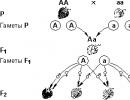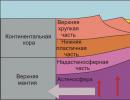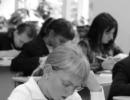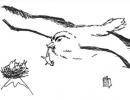Specialty in mechanics and mathematical modeling. Mechanics and mathematical modeling - bachelor's degree (01.03.03) Mathematical modeling profession
During their studies, students acquire scientific knowledge on computer modeling of various mechanical processes, develop the ability to analytical thinking, learn to apply in practice the fundamentals of fundamental mathematics, mechanics, physics and other natural sciences.
Graduates find application of their knowledge in engineering centers of industrial companies, gas and oil industries, transnational corporations, research and design bureaus involved in the development of new engineering technologies.
"Mechanics and math modeling" - a direction that allows in the future to make a choice from quite large number interesting professions:
-
mathematician,
analyst,
supervisor,
researcher,
teacher of physical and mathematical disciplines,
mathematical modeling specialist.
Researcher,
Direction characteristics
| Characteristic | Index |
| Training is conducted by | |
| Level of training | Bachelor's degree |
| Direction code | 01.03.03 |
| Total number of budget places | 25 |
| of which places are for persons with special rights | 3 |
| Quantity paid places | 25 |
| Entrance tests | Computer Science and ICT - 42
Russian language - 40 Mathematics - 39 |
| Priority entrance examinations | Mathematics; Computer Science and Information and Communication Technologies (ICT); Russian language. |
| Competition for budget places in 2019 | 8,50 |
| Minimum total score when enrolling in a budget this direction in 2019 | 216 |
| Graduate qualification | Bachelor |
| Form of study | Full-time |
| Duration of full-time study | 4 years |
| Cost of full-time training | RUB 139,707 (in 2019) |
Syllabus
Basic profile disciplines:
- mathematical analysis;
- differential equations;
- theoretical mechanics;
- partial differential equations;
- fluid dynamics;
- numerical methods in continuum mechanics;
- physics of oil and gas reservoir;
- dynamic systems;
- application packages;
- dynamics of compressible media;
- computer mathematics systems.
Classes are taught by full-time teachers: doctors and candidates of science:
Tatosov A.V. , professor, doctor of sciences;
Shalaginov S.D. , associate professor, candidate of sciences;
Machulis V.V. ,Associate Professor, Candidate of Sciences;
Mosyagin V.E. , associate professor, candidate of sciences;
Devyatkov A.P. , associate professor, candidate of sciences;
Butakova N.N. , associate professor, candidate of sciences;
Basinsky K.Yu. , associate professor, candidate of sciences.Practices
Siberian and Ural Branch of the Academy of Sciences of the Russian Federation, OJSC Sberbank of Russia, OJSC Zapsibkombank, Schlumberger, LLC Tyumen Institute of Oil and Gas, LLC TyumenNIPIGIPROGAZ, ITAM SB RAS. Khristianovich, Bank VTB-24, JSC SibNATs, LLC UNI-CONCORD, Institute of the Earth's Cryosphere SB RAS, JSC Rusgazproekt, JSC Nizhneobsky NIPI, NPO Sibtekhneft, JSC Giprotyumenneftegaz, JSC INFA , SurgutNIPINeft, NPO Fundamentstroyarkos, Gazpromproektirovanie LLC, Ingeoservice LLC, KogalymNIPINeft LLC.
Achievements
- The TSU SPE Student Chapter team (consisting of D.V. Balin) reached the student finals intellectual game PetroBowl in London.
- Victory in the competition for the best student works Danil Balin - “The influence of the auto-fracturing process on field development”, scientific. head M.Yu. Danko, head of the hydrodynamic modeling department of JSC Tyumen Institute of Oil and Gas
Learning outcomes
Ability to solve complex problems using information and communication technologies.
Usage mathematical analysis in the field of theoretical and applied mechanics, geometry, differential equations and probability theory.
Work with specialized programs for modeling and optimization of technological processes.
Scientific lesson research work alone or in a group.
Solving mechanical modeling problems without the participation of a PC (if the situation requires it).
Adapting your knowledge to the organization educational process in the field of their competence (physics, mechanics, mathematics, computer science).
Organization of pedagogical, scientific, managerial, production and technological activities.
Employment and career
Areas of activity:
Bachelors have the opportunity to work in any field of science, industry, production, management related to mathematics, engineering, physics, mechanics and programming.
Places of employment for bachelors:
Siberian and Ural Branch of the Academy of Sciences of the Russian Federation, Central Bank, Sberbank of Russia OJSC, Zapsibkombank OJSC, Surgutneftegazbank OJSC, SibNIINP OJSC, Schlumberger, Tyumen Institute of Oil and Gas LLC, TyumenNIPIGIPROGAZ LLC, OJSC Gazpromneft", CJSC "VostokNefteGazProekt", ITAM SB RAS named after. Khristianovich, Bank VTB-24, JSC SibNATs, LLC UNI-CONCORD, Institute of the Earth's Cryosphere SB RAS, JSC Rusgazproekt, JSC Nizhneobsky NIPI, NPO Sibtekhneft, JSC Giprotyumenneftegaz, JSC INFA , SurgutNIPINeft, NPO Fundamentstroyarkos, Gazpromproektirovanie LLC, Ingeoservice LLC, KogalymNIPINeft LLC.
Internships for students, undergraduates and graduate students:
- Evgeny Popov – RF Presidential Scholarship recipient for studying abroad, Cloud Computing Center University of Birmingham (UK);
- Artem Vorobyov – RF Presidential scholarship holder for studying abroad, Nanyang University of Technology(Singapore);
- Alexander Kropotin – scholarship holder of the President of the Russian Federation for studying abroad, Ulm University (Germany);
- Alexander Stupnikov – scholarship holder of the President of the Russian Federation for studying abroad, Ulm University (Germany);
- Natalya Derevyasnikova – “Semester Abroad” program, University of Passau (Germany);
- Arthur Romazanov, Evgenia Egorova – “Semester Abroad” program, University of Passau (Germany);
- Andrey Rybkin – “Semester Abroad” program, Kindai University (Osaka, Japan);
- Anna Zhikhareva – Global UGRAD student exchange program, Idaho State University at Boise (USA);
- Ekaterina Lobanova – Fulbright FLTA program, Wheaton College (Norton, USA)
- Alexander Gorbachev – Fulbright program, state research university(New York State, USA);
- Natalya Derevyasnikova, Anton Lyachek – internship, Huawei company (Shenzhen and Beijing, China);
- Polina Gultyaeva, Vladislav Fishman – “Semester Abroad” program, University of Koblenz-Landau (Germany)
- Lusine Harutyunyan, Mikhail Lyapunov – “Semester Abroad” program, University of Guadalajara (Mexico)
- Maria Rudzevich, Director of the Department of Informatization of the Tyumen Region
- Garif Romashkin, manager of the regional bank VTB24
- Evgeny Popov, researcher at the Cloud Computing Center at the University of Birmingham (UK), winner of grants from the President of the Russian Federation, Potanin Foundation, Governor's Scholarship, winner of IT Planet and WorldSkills Russia in the “Network and System Administration” competency
- Mikhail Fuchko, national expert at WorldSkills Russia in the “Network and System Administration” competency, coach of the WorldSkills Russia national team, head. Laboratory of Network and System Administration of Tyumen State University.
- Elena Tolubaeva, head of the information technology department of the Federal Tax Service of Russia for the Kurgan region
- Ivan Karyakin, director of the IT company Mintrocket
- Pavel Mostovoy, leading specialist of the department for support of large geological exploration projects, Gazprom Neft Scientific and Technical Center
- Anna Semenova, specialist of the information and analytical department of the MAOU "Information and Methodological Center"
- Olga Chuenko, Deputy Director of the State Public Institution TO "Information Technology Center of the Tyumen Region"
- Maria Krovatkina, network engineer at Schlumberger Logelco inc (Europe and Africa)
- Inna Grigorieva, head. Basic Department of Business Process Automation (on the 1C:Enterprise platform), Ph.D.
- Vladislav Shkabura, developer, Schlumberger
- Alexander Blazhenskikh, developer at Yandex.Cloud
- Mikhail Grigoriev, national expert of WorldSkills Russia, associate professor of the department of software and systems engineering, Ph.D.
- Yulia Boganyuk, head. computer laboratories of IMiKN, winner of the regional competition scientific works, winner of the Miss IT Tyumen Region competition, WorldSkills Russia expert in the “Machine Learning and Big Data” competency
- Igor Maschitsky, data processing specialist at SAP IT-SERVICE LLC (SIBUR)
- Andrey Sorokin, head of the processing group, department of operational support of seismic exploration works of Gazpromneft Scientific and Technical Center LLC
- Sergei Glazunov, one of the most famous white hat hackers in Russia. For work on finding vulnerabilities Chrome Google paid him more than $80,000,
- Andrey Labunets, information security department specialist at Facebook
- Alexander Gorbachev, winner and prize-winner of national championships, World Skills World Championships, European Championships in the system administration category, grant holder for master's studies in the USA.
- Irina Prudaeva, Deputy Director of the Office for Implementation of Programs and Projects Information and Methodological Center
- Elena Sycheva, development engineer, Tyumen Institute of Oil and Gas
- Tatyana Yuferova, winner of the WorldSkills Russia Tyumen, WorldSkills Russia Ural, WorldSkills Russia National Championships in the “Software Solutions for Business” category
- Andrey Evdokimov, technical specialist of the Department of technological support for standardized procedures for assessing student achievements, TOGIRRO
- Yuri Egorov, leading development engineer at Baspro Group of Companies
- Anna Kozhevnikova, software engineer of the I&C Service under the Gazprom Dobycha Urengoy Administration
- Evgeny Kabardinsky, Software Engineer at Leadex Systems
- Konstantin Borisov, Chief Specialist of the Department of Consolidated Planning and Production Calculation, Gazpromneft-Yamal LLC
- Nikita Pogodin, Java developer at Luxoft
- Abdullah Bashiru, Alsart Software Manager (Lagos/Nigeria)
- N.S. Bakhtiy, Head of the Department of Mathematical Modeling of Oil and Gas Fields at SurgutNIPIneft, Ph.D.
- A.A. Zolotov, Development Director of the Tyumen Region CIO Club, Head of Development Department information systems LLC "Concord Soft"
- I.N. Polishchuk, Director of the Tyumen branch of JSC GIS-ASUproekt, Ph.D.
- V.V. Trofimov, Development Director, Rostelecom PJSC branch in the Tyumen and Kurgan regions
- A. Parkhomtsev, director of Louis+ Western Siberia LLC
- A.P. Devyatkov, Associate Professor of the Department of Fundamental Mathematics and Mechanics of the Institute of Computer Science and Technology, Ph.D.
- Northeastern Pedagogical University(China).
- Qufu State Normal University (China).
- University of Passau (Germany).
- University of Münster (Germany).
- graduate School Administrative Sciences, Speyer (Germany).
- Tallinn University (Estonia).
- Daugavpils University (Latvia).
- New Bulgarian University of Sofia (Bulgaria).
- University named after Humboldt in Berlin.
- University of Navarra (Spain).
- University of Strasbourg (France).
- University of Lorraine Metz (France).
- University of Toulouse 2 – Le Mirail (France).
- Bodo University College (Norway).
- University of Oslo (Norway).
- University of Wolverhampton (UK).
- University of California, Los Angeles (USA).
- Federal University Fluminense (Brazil).
- Agreement on cooperation between the Federal Agency for Commonwealth Affairs Independent States, compatriots living abroad, and on international humanitarian cooperation (Rossotrudnichestvo).
- Eurasian Humanitarian Institute (Republic of Kazakhstan).
- Yerevan State University (Republic of Armenia).
- Tashkent University of Information Technologies.
- University of Informatics and Information Technologies named after. Apostle Paul, Ohrid.
- University of Lüneburg.
Partner companies
- Microsoft, Samsung
- Zapsibcombank
- SKB Kontur
- LLC "Tyumen Institute of Oil and Gas"
- BaseGroup Labs
Institute of Mathematics and Computer Science
- Bachelor's degree
- 01.03.01 Mathematics
- 01.03.02 Applied mathematics and computer science
- 01.03.03 Mechanics and mathematical modeling
- 01.03.04 Applied Mathematics
- Specialty
- 01.05.01 Fundamental mathematics and mechanics
The future of the industry
What technologies should a state have in order to be strong and independent in the 21st century? Space, nuclear power, encryption, design, humanitarian technologies - mathematics is needed for all these and many other technologies, without which the future is unthinkable.
Mathematics is the basis, the basis for all natural sciences and many humanities. Thanks to the development of this science, humanity has made an impressive technological leap forward last century. Without mathematics, the development of physics, chemistry, engineering, programming, architecture and many other disciplines is impossible. Without knowing mathematics you cannot build a house or design an engine. internal combustion, create a computer program. Mathematics is a means, a tool for other scientific disciplines, with the help of which you can translate the real properties of an object or system into abstract mathematical symbols and build models of the future operation of the system or object. Mathematics is a universal language that can be understood in any country.
Without knowledge of mathematics to live in modern world impossible in the period of globalization. But if the elementary fundamentals of this science are enough for most people, then for successful work Some areas of human activity require deep knowledge of this discipline.
Perhaps in the future the line between mathematics and other sciences will be erased, but now specially trained mathematicians are absolutely necessary in knowledge-intensive industries of any profile, in sociology, politics and education.
Benefits of training
- Fundamental mathematical training, providing the opportunity to actively work in the most complex areas of modern mechanics; in-depth knowledge of programming, allowing for computer modeling of processes and phenomena in various systems
- Availability of existing scientific schools, which allow students to actively engage in research work directly at the University
- Outstanding team of teachers and researchers, which provides training in all areas of modern mechanics
- Work on unique experimental facilities in our own laboratories, a combination of theoretical and experimental approaches, allowing graduates to comprehensively study the most complex problems of mechanics
- Mastering applied programs for solving problems of theoretical mechanics, hydroaeromechanics and elasticity theory (ANSYS, FLUENT, etc.) and creating your own algorithms and programs for specific tasks modern mechanics on the most modern computer technology
Famous teachers
- N. F. Morozov - Head of the Department of Elasticity Theory of St. Petersburg State University, Academician of the Russian Academy of Sciences, Professor, Doctor of Physical and Mathematical Sciences. Specialist in nonlinear theory elasticity, mathematical methods of fracture mechanics. Author of more than 200 publications in Scopus and Web of Science
- P. E. Tovstik - head of the Department of Theoretical and Applied Mechanics of St. Petersburg State University, professor, Doctor of Physical and Mathematical Sciences, laureate of the State Prize of the Russian Federation, Honored Scientist of the Russian Federation, holder of the Order of Honor, honorary professor of St. Petersburg State University. Specialist in the field of asymptotic and numerical methods in theoretical mechanics, theory of thin-walled structures, mechanics solid and nanomechanics. Author of more than 250 scientific works, including ten monographs and textbooks
- Yu. V. Petrov - Professor at St. Petersburg State University, Head of the Department of “Extreme States of Materials and Structures” at the Institute of Mechanical Engineering of the Russian Academy of Sciences, Corresponding Member of the Russian Academy of Sciences, Professor, Doctor of Physical and Mathematical Sciences. Specialist in the dynamic theory of elasticity and plasticity, physics and mechanics of shock wave processes, dynamics of deformation and fracture of solids, detonation and explosion. Author of more than 200 publications in Scopus and Web of Science
- E. V. Kustova - Head of the Department of Hydroaeromechanics of St. Petersburg State University, Doctor of Physical and Mathematical Sciences, Professor of the Russian Academy of Sciences. Specialist in the field of kinetic theory of transfer and relaxation processes in nonequilibrium reacting gases, studies of heat and mass transfer on the surface of aircraft entering the atmosphere of Earth and Mars. Author of more than 200 scientific papers, including more than 120 publications in Scopus and Web of Science, five monographs and textbooks
Future career
Places of practice
The training involves educational, research and production internships at the departments and scientific laboratories of St. Petersburg State University.
List of key professions
Graduates of the program are ready for successful professional activity in research, development and design institutes, V construction industry, mechanical engineering, in the rocket and space industry, biomechanics, robotics and other areas of technology and natural science related to the development and application mathematical methods. They can work as specialists in research and development work in the field of mathematical modeling, scientific and applied research for knowledge-intensive high-tech industries, production and technological activities. Possible pedagogical work in the field of secondary general and vocational education.
Organizations where graduates work
Graduates of the program continue their studies in master's programs at St. Petersburg State University and other universities, work in institutes of the Russian Academy of Sciences, at enterprises of the Roscosmos State Corporation, in subsidiaries of Gazprom Neft PJSC, enterprises of United Shipbuilding Corporation JSC, Almaz-Antey East Kazakhstan Concern JSC ", in the Krylov State scientific center, the Central Institute of Aviation Engine Engineering named after P.I. Baranov (CIAM), enterprises of the Mavis Investment Group of Companies, at the Izhora plant, at the shipbuilding NPO Almaz, at the Obukhov plant, at the Rubin Federal State Institution.
Students studying in this profile acquire knowledge in theoretical and applied areas of mechanics:
theoretical mechanics,
management theory,
theory of motion stability and stabilization,
mechanics of deformable solids,
hydro-aeromechanics,
theory of oscillations,
applied mechanics,
robotics and others.
Along with theoretical knowledge, they master experimental and computational methods for studying the movement and state of material bodies. Much attention is paid to the study of basic mathematical disciplines and computer science. Graduates have the opportunity to continue their studies in graduate school at the university and institutes of the Ural Branch of the Russian Academy of Sciences. During the learning process, students actively participate in research work, in All-Russian Olympiads, scientific competitions and conferences.
Students specialize in the following areas: mathematical modeling, theory of stability and control, mechanics of deformable solids, computer mechanics, as well as in solving problems of the development of modern technology, problems of economics and finance, ecology and biotechnology, management using high-performance technologies.
Having universal knowledge allows graduates to work not only in research institutes, universities and design bureaus of large industrial organizations, but also in economic and business structures. Among the graduates are not only famous scientists, including the President Russian Academy sciences, heads of research organizations, industrial firms and universities, highly qualified specialists, including in the field of computer technology, but also businessmen and top managers of commercial structures.
A popular video clip about the direction "Mechanics and Mathematical Modeling" with pictures and music.
Why should you enroll in mathematics or mechanics?
Over the many years of the faculty’s existence, one of the best mathematical schools in the country has been formed,
There are a lot of cool teachers here: professors and scientists,
After the second year, both areas are divided into specializations and you can choose the most interesting area to study
in mathematics:
Discrete Math;
Mathematical cybernetics;
Mathematical biology and bioinformatics;
Mathematical methods in economics;
System Programming;
And much more
on mechanics:
Math modeling;
Theory of sustainability and management;
Mechanics of deformed solids;
Computer Mechanics;
In senior courses you can teach scientific activity: conduct your own research, write articles for scientific publications;
Each semester, additional courses are taught on different topics, which can be taken regardless of the direction of study and the chosen specialty.
Who will be interested first?
For those who want to develop mathematical thinking;
For those who want to do science;
For those who are strong in the exact sciences, but have not yet decided what is more interesting to them;
The mechanics major is suitable for those who are interested in both mathematics and physics.
What kind of work can you do after graduating from mathematics?
Anyone and in any field!
People who can think are highly valued, and mathematical thinking skills will allow you to find something you like in any field. Graduates of mathematical directions of Mathematical Mechanics can be found:
In various positions in the IT field: from programmers to interface designers, from system administrators to project managers;
In the financial sector as analysts, economists, financiers, auditors;
Among engineers and technical specialists in every field from construction to the space industry;
In schools, institutes and universities, scientific laboratories and in the academy of sciences, where they work as scientists, teachers and managers.
Differences in mathematical directions:
Mathematics:
More choice of special courses and specializations,
Strong mathematics and serious programming background
Mechanics:
Most of the courses are taught by teachers from one of the oldest departments of the faculty - the Department of Mechanics and Mathematical Modeling,
The main emphasis is on theoretical and applied sections of physics.
The most common entrance exams:
- Russian language
- Mathematics ( a basic level of)
- Physics is a specialized subject, at the choice of the university
- Computer science and information and communication technologies (ICT) - at the university's choice
Professions
“Mechanics and mathematical modeling” is a specialty that allows you to choose from a fairly large number of interesting professions in the future:
- Researcher,
- engineer,
- mathematician,
- analyst,
- supervisor,
- researcher,
- teacher of physical and mathematical disciplines,
- mathematical modeling specialist.
Academic bachelors have the opportunity to work in any field of science, industry, production, management related to mathematics, engineering, physics, mechanics and programming.
Description of specialty
During their studies, students acquire scientific knowledge on computer modeling of various mechanical processes. Students study computational mathematics, mechanics and biomechanics, the theory of stability of electromechanical devices, the degree of elasticity, density and plasticity of materials. They master the static and dynamic strength of various objects and other sciences, one way or another related to theoretical mechanics, mathematics, engineering, strength materials.
During the learning process, students develop analytical thinking abilities, study the fundamentals of economics and production management, and learn to apply in practice the fundamentals of fundamental mathematics, mechanics, physics and other natural sciences.
A special feature of training in the specialty “Mechanics and Mathematical Modeling” is a large number of standard hours devoted to workshops. Where students have a unique opportunity to apply their theoretical knowledge in action, analyze and synthesize specific information. Some of the workshops are devoted to working with computer-mathematical modeling programs designed to simulate technological processes on a monitor screen.
Graduates find application of their knowledge in engineering centers of industrial companies, gas and oil industries, transnational corporations, research and design bureaus, including foreign ones, involved in the development of new engineering technologies.
Basic subjects when studying for a specialty
- Mechanics of deformable bodies and media.
- Mathematical modeling and computer engineering.
In addition, students study philosophy, history, foreign language and life safety (basics of life safety). Required disciplines: Physical Culture and applied physical culture.
Duration of training
Duration of full-time education in the specialty"Mechanics and mathematical modeling" is 4 years (including holidays). Full-time and distance learning, by decision of the administration, can be extended for a period of six months to a year.
Skills and abilities acquired during training
- Ability to solve complex problems using information and communication technologies.
- Use of mathematical analysis in the field of theoretical and applied mechanics, strength of metals, geometry, differential equations and probability theory.
- Work with specialized programs for modeling and optimization of technological processes.
- Doing research work independently or in a group.
- Solving mechanical modeling problems without the participation of a PC (if the situation requires it).
- Adapting your knowledge to the organization of the educational process in your field of competence (physics, mechanics, mathematics, computer science).
- Organization of pedagogical, scientific, managerial, production and technological activities.
During the training, the bachelor acquires the professional skills necessary for competent engineering and analysis of complex mechanical objects using computer and/or physical analysis.






